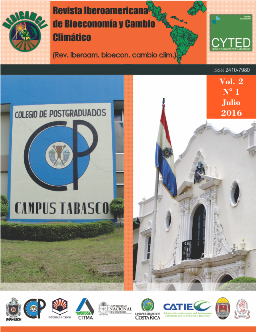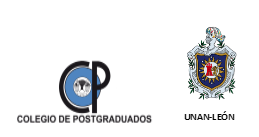Economic assessment of profitability and carbon capture in cocoa plantations Chontalpa Tabasco Plan.
DOI:
https://doi.org/10.5377/ribcc.v2i1.5680Keywords:
Carbon, Cocoa, Income, Utility, Agroforestry SystemAbstract
The profitability and capture carbon in three cocoa plots from different ages was evaluated. A structured questionnaire was applied a 36 cocoa farmers belonging to the populated C-34 of Huimanguillo, Tabasco. Expenditures and revenues was evaluated in monetary terms of the cacao plantation. For the determination of carbon capture nine sites were studied with surface of three acres each belonging to the populated C-34 and a site located at Km-21 experimental field of the Graduate College. For quantification of carbon, rapid methodology for estimating and monitoring carbon sequestration given by Rendon & Soto was used, 2007. For statistical analysis, ANOVA analysis was used and Tukey Kramer test. The cocoa plantation of 20 years obtained the most useful with $ 7,653 ± $ 3,921, while cocoa plantation 30 years of age had the lowest average income to $ 5.899 ± 3.420. Statistical analysis showed no statistically significant differences in terms of carbon captured from one age to another. However, Cacao plantations 15 old had the highest average in t/ha-1 de C (100.6 ± 110.5 t/ha-1 ), while plantations 20 years old had the lowest average catch of C (49.9 ± 14 t/ha-1 ).Downloads
1028
HTML (Español (España)) 0
Published
How to Cite
Issue
Section
License
Copyright (c) 2016 Rev. iberoam. bioecon. cambio clim.

This work is licensed under a Creative Commons Attribution-NonCommercial-ShareAlike 4.0 International License.
Copyright © Rev. iberoam. bioecon. climate change (Graduate School and UNAN-León, School of Agricultural and Veterinary Sciences / Department of Agroecology / Center for Research in Bioeconomy and Climate Cahnge (CRByCC).







